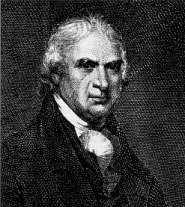James Madison (16.03.1751 — 28.06.1836) - fourth president of the USA. James Madison is known as the “father of the Constitution” because he played a major role at the Constitutional Convention of 1787. He drafted the Virginia Plan, with which the convention began its work, and he was instrumental in adding to the powers of Congress and the Presidency and in providing for a system of checks and balances among the branches of government. His own Presidency, however, was beset with difficulties, largely because of the workings of the checks and balances he had helped to create. Madison grew up on his affluent family's plantation, Montpelier. Educated at the College of New Jersey, he then studied law and became a member of Orange County's Committee of Safety in 1774, at the start of the Revolution. At Virginia's constitutional convention of 1776 he fought for a clause protecting freedom of religion. He served in the Governor's Council for most of the remainder of the war. In the 1780s, as a member of the Continental Congress under the Articles of Confederation, he advocated strengthening its powers (particularly the power of taxation) to provide more effective government. In 1785, in the Virginia House of Delegates, he fought successfully for separation of church and state. With Alexander Hamilton he helped to organize the Annapolis Convention of 1786, a meeting of five states that proposed stronger powers for the national government in interstate commerce, and the Constitutional Convention in Philadelphia in 1787. At that convention Madison helped put together the key compromises that kept the convention going, though the delegates rejected a number of his proposals, including a council of state to share executive power, a congressional veto on state laws, a Senate share in the Presidential power to pardon, a Supreme Court power to impeach the President, and a Supreme Court share in the Presidential veto power. Madison also unsuccessfully opposed any extension of the slave trade, which the convention decided to protect until 1808. Madison later published his notes on the convention debates, which are today the primary source for historians studying the convention. Madison teamed up with Hamilton and John Jay to write The Federalist Papers, a set of essays defending the Constitution against attack by its critics and calling for its ratification. Madison wrote under the pen name Publius. He led the pro-Constitution faction at the Virginia ratifying convention, opposing the Anti-Federalists led by Patrick Henry and James Monroe. Madison was passed over by the Virginia legislature for election to the U.S. Senate because the state legislators doubted that he would “obey instructions” on how to vote in the Senate. In 1788, however, he defeated James Monroe in the first elections held for the House of Representatives. As a member of the first Congress, Madison fulfilled a campaign pledge by proposing a Bill of Rights to protect civil liberties from actions of the national government. He also drafted legislation that organized the Departments of Foreign Affairs, War, and the Treasury. Although he held no official title, Madison served as floor leader of the House for President George Washington's administration during the 1st Congress. However, he soon came to oppose the financial program of the first Treasury secretary, Alexander Hamilton, particularly the protective tariff (a tax on imported goods), as well as Washington's Proclamation of Neutrality, which kept the United States out of the war between Great Britain and France. Together with Thomas Jefferson, Madison organized an opposition faction that later became the Democratic-Republican party, and they attracted to it most of the Anti-Federalists of the 1780s. During the undeclared naval war with France in 1798 the Federalist Congress passed the Alien and Sedition Acts, which made it a crime to publish criticism of government war policies. In response, in 1798 Madison and Jefferson wrote the Kentucky and Virginia Resolutions, which stated that the Alien and Sedition Acts were unconstitutional and which implied that the states need not enforce them. This was a reversal of Madison's strong “nationalist” position of the 1780s, when he wanted national law to be supreme over state laws. After Jefferson was elected President in 1800, Madison became his secretary of state. He defended the Louisiana Purchase and supported Jefferson's decision to ask Congress to pass an Embargo Act, which would ban trade with European nations while they were at war. His negotiations with Spain to acquire Florida were unsuccessful. In 1808 the Republican congressional caucus nominated Madison for the Presidency. He defeated his Federalist opponent, Charles Cotesworth Pinckney, 122 electoral votes to 47. Foreign policy preoccupied the Madison Presidency; the President acted as his own secretary of state until the appointment of James Monroe in 1811 to replace the incompetent Robert Smith. In 1809 Congress repealed Jefferson's Embargo Act, which forbade carrying foreign goods on American ships, and replaced it with the Non-Intercourse Act, which banned all trade with England and France until those countries ceased interfering with U.S. shipping. Madison declared that trade with Great Britain would be permitted but soon found that assurances that U.S. ships would be left alone were not honored by the British government. Madison issued a nonintercourse proclamation against Great Britain in November 1810. Congress then passed a bill that ended all restrictions on U.S. trade with Europe. It promised, however, that if the British would cease harassing American ships, the United States would bar trade with its enemy France, and if the French would cease harassment, the United States would bar trade with Great Britain. French emperor Napoleon promised freedom of the seas to U.S. ships, and Madison issued a nonintercourse proclamation against the British. Then Napoleon betrayed Madison by issuing new decrees against U.S. shipping, forcing the President to admit to Congress that his policy had failed. The “war hawks” in Congress urged Madison to declare war against Great Britain, and they pressed for an invasion of Canada. Although the nation was unprepared for war and large parts of New England opposed it, on June 1, 1812, Madison bowed to the war hawks in his party and sent a secret message to Congress asking for a declaration of war. Not everyone approved of war, and the declaration carried in the House by 79 to 49 and in the Senate by only 19 to 13. Madison signed the declaration on June 18, 1812. He had already been unanimously renominated by the Republican caucus, and in the general election he defeated DeWin Clinton. The War of 1812 was a disaster. A U.S. invasion of Canada failed, and much of the Northwest Territory, including the key outpost at Detroit, was retaken by the British. By 1813 the British navy had bottled up U.S. naval vessels and blockaded the American coast. After defeating Napoleon in Europe, the British were able to transfer 14 new regiments to the war effort in the United States. They marched into Washington, D.C., on August 24, 1814, and burned the Capitol, the President's House, and other public buildings in retaliation for a U.S. raid on Toronto the year before. When Madison returned to the capital, he took up residence in the Octagon House, near the ruined President's House. Congress reassembled in the old patents and post office building next to the ruined Capitol Building. Disgruntled Federalists met in Hartford, Connecticut, in December 1814 to demand that Madison end the war. Republicans claimed that Federalists at the meeting, known as the Hartford Convention, were plotting to secede from the Union. But the news was not all bad. Heroic resistance by the defenders of Fort McHenry prevented the British from capturing Baltimore and inspired Francis Scott Key, who was imprisoned on a British ship attacking the fort, to write “The Star Spangled Banner.” The British suffered major defeats in northern New York State and Mobile, Alabama. Then Andrew Jackson won the Battle of New Orleans. Even before that battle, the British and U.S. peace negotiators had signed the Treaty of Ghent (though news had not yet reached the United States), and Madison urged the Senate to consent to it. The United States failed to gain any of its war aims and was lucky to keep all its territory intact. But Americans had not conceded any rights to a greater power and had demonstrated their willingness to fight for freedom of the seas. At the end of the war Madison turned to domestic matters. He called for a larger military, a protective tariff, a system of roads and canals, and a national university. Congress authorized a stronger military establishment and passed the first protective tariff in U.S. history but did not act on the bill for a university—something Madison had tried to put in the Constitution in 1787. He also won congressional approval to charter the Second Bank of the United States. Madison retired to his plantation at Montpelier in 1817. He participated in the Virginia Constitutional Convention of 1829, organized his notes of the federal convention of 1787 for publication, and was rector of the University of Virginia from 1826 until his death in 1836.
|
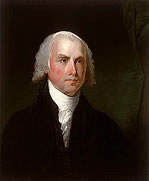 |
James Madison Born: March 16, 1751
|
|
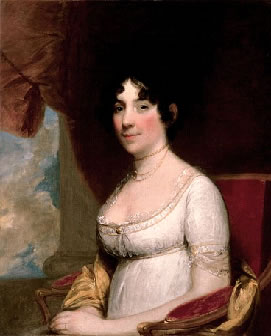 |
|
First lady: Dolley Madison |
|
|
|
Vice-president: George Clinton (1805 — 1812) |
|
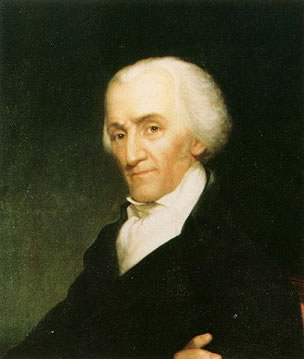 |
|
Vice-president: Elbridge Thomas Gerry (1813 — 1817) |
|
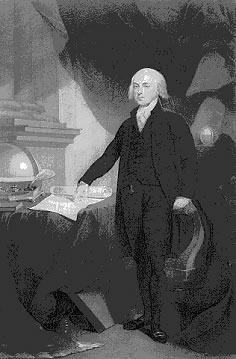 |
|
| James Madison engraving by David Edwin from between 1809 and 1817 | |
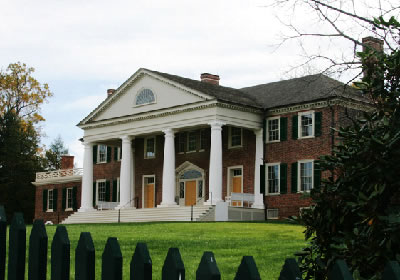 |
|
| Montpelier, Madison's tobacco plantation in Virginia |
